1. Choosing a hutch:
Traditional small hutches can compromise rabbit welfare as they do not allow rabbits to behave normally. A hutch should actually only be viewed as your rabbits’ ‘bedroom’.
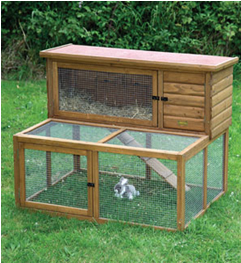 It should be permanently attached to a much larger run or exercise area, so your rabbits can decide when they go outside to stretch their legs.
It should be permanently attached to a much larger run or exercise area, so your rabbits can decide when they go outside to stretch their legs.
A good quality hutch provides shelter and protection from extremes of weather and temperature, is draught-free and predator proof, and is a cosy place to sleep.
Provide lots of bedding for your rabbit to keep your rabbits warm; this should also be safe for your rabbits to eat such as dust-free hay. In the wintertime when it’s particularly cold, you should consider moving your rabbits’ home somewhere warmer such as a shed, unused garage or outhouse; and don’t forget to make sure they can exercise everyday.
The bedroom area should be as big as possible:
• Big enough to allow rabbits to lie down and stretch out comfortably in all directions.
• Tall enough for them to sit (and ideally stand) up on their back legs without their ears touching the roof.
• Long enough to allow at least three continuous hops from one end to the other (make sure there are no obstructions in the way).
• As rabbits should be housed in friendly pairs or groups, their bedroom area should be enough to allow all the rabbits to perform all the behaviours mentioned above at the same time.
2. Giving your rabbit space: It’s important that your rabbits have plenty of space to run around, leap, dig, frolic and graze, because this is what happy rabbits like to do. A secure exercise run or enclosure will allow your rabbits to exercise, graze and play safely.
It’s important that your rabbits have plenty of space to run around, leap, dig, frolic and graze, because this is what happy rabbits like to do. A secure exercise run or enclosure will allow your rabbits to exercise, graze and play safely.
• The general rule for the size of the smallest run advisable should be big enough for your rabbit to hop across three times and stand without their ears touching the top. This should permanently attached to your rabbits hutch.
• Preferably, the run should be placed in the garden so the rabbits can enjoy the grass as they would in the wild.
• Make sure the roof of the run is covered and that the run is secure from predators. Make sure the run is escape-proof.
• Make sure you also provide constant access to places to hide in the run, such as boxes or wide tubes. Rabbits are prey animals and need to be able to hide when frightened.
• Provide a ‘digging’ area with child-safe play sand or earth. A dedicated area will help discourage them from digging up your lawn, but make sure the bottom of this area is secure so that your rabbits don’t end up digging their way out of the run.
3. Indoor or Outdoor? Some people like to keep their rabbits as house pets, living life indoors and never going outside. Others prefer to keep theirs in a hutch in the garden, perhaps moving them into a garage during the colder winter months – in other words, outdoor rabbits.
Some people like to keep their rabbits as house pets, living life indoors and never going outside. Others prefer to keep theirs in a hutch in the garden, perhaps moving them into a garage during the colder winter months – in other words, outdoor rabbits.
Rabbits can be perfectly happy living either lifestyle, so long as owners take certain precautions:
Indoor rabbits
• Make sure your house is rabbit-proofed. Rabbits will chew through electrical wires and cables, so these must be protected to avoid damage and potential injury – not to mention large repair bills.
• Climate control – if a rabbit is too hot they are prone to gaining weight, as they do not need to burn off any calories to help regulate their temperature. Try and ensure your rabbit’s hutch is kept in a cool, but not cold, area.
• If your rabbit is free to run around the house, it is best not to have wooden or laminate floors. Rabbits cannot grip shiny surfaces, so are liable to slip, risking injury.
Outdoor rabbits • Make sure your garden is free of poisonous plants. Rabbits will have a nibble of anything, and eating a poisonous plant can affect your rabbit in a variety of ways.
• Make sure your garden is free of poisonous plants. Rabbits will have a nibble of anything, and eating a poisonous plant can affect your rabbit in a variety of ways.
Some of the most common poisonous plants to watch out for are: anemone, autumn crocus, azalea, begonia, bluebell, busy lizzie, buttercup, carnation, chrysanthemum, clematis, cowslip, daffodil, dahlia, deadly nightshade, foxglove, hemlock, iris, ivy, laburnum, laurel, lily of the valley, poppy, privet, ragwort, rhododendron, tulip, woody nightshade, yew, yucca (please note: this is not an exhaustive list of poisonous plants)
• Outdoor rabbits can become stressed through fear of predators, so try to minimise cases where this may be a problem.
If your neighbour has a dog for example, you should keep your rabbit in an area of your own garden where it cannot see the other animal.
 Good bacteria in the caecum ferment the fibre which then emerges in the form of clumps of sticky droppings called caecotrophs.
Good bacteria in the caecum ferment the fibre which then emerges in the form of clumps of sticky droppings called caecotrophs. As the crown length increases the top and bottom teeth start pressing together when the mouth is closed which restricts further eruption, but tooth growth continues so they start curving and developing sharp painful spikes in the mouth, and the roots push backwards into the jaw and skull.
As the crown length increases the top and bottom teeth start pressing together when the mouth is closed which restricts further eruption, but tooth growth continues so they start curving and developing sharp painful spikes in the mouth, and the roots push backwards into the jaw and skull.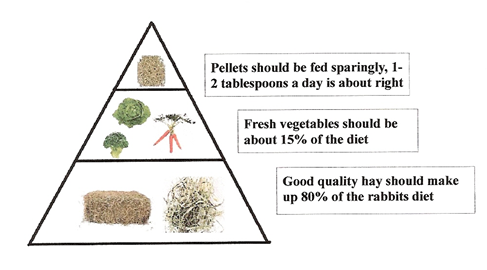 Rabbits can’t get enough nutrition from fibre when it passes through their gut the first time, so they pass it through a second time, by eating their poo!
Rabbits can’t get enough nutrition from fibre when it passes through their gut the first time, so they pass it through a second time, by eating their poo!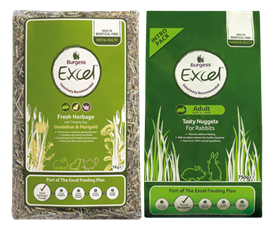 Step 1 – Herbage and Forage – High quality hay and grass foods should form the majority of your pet’s diet (75-80%).
Step 1 – Herbage and Forage – High quality hay and grass foods should form the majority of your pet’s diet (75-80%). We recommend that all pet rabbits should be neutered. In females, it prevents unwanted pregnancy and eliminates cancer of the uterus, but it makes both sexes calmer and less aggressive.
We recommend that all pet rabbits should be neutered. In females, it prevents unwanted pregnancy and eliminates cancer of the uterus, but it makes both sexes calmer and less aggressive.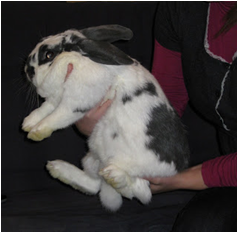 Rabbits need time to get used to their surroundings, so don’t try to pick your new rabbit up for the first few days.
Rabbits need time to get used to their surroundings, so don’t try to pick your new rabbit up for the first few days.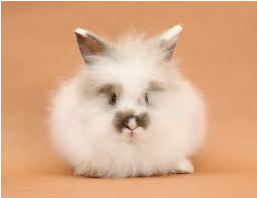 Some breeds of rabbit, particularly the long-haired varieties, need brushing daily to remove loose and matted hair.
Some breeds of rabbit, particularly the long-haired varieties, need brushing daily to remove loose and matted hair.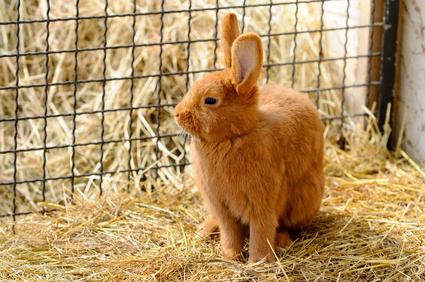 • Rabbits are prey animals first and foremost and their natural response to a perceived threat is to often run and hide. They have a wonderful ability to interact with humans but need time and regular, gentle handling from an early age to become comfortable around humans.
• Rabbits are prey animals first and foremost and their natural response to a perceived threat is to often run and hide. They have a wonderful ability to interact with humans but need time and regular, gentle handling from an early age to become comfortable around humans.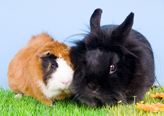 Contrary to popular belief, guinea pigs should NOT be kept as companions for rabbits. They have different dietary requirements and communicate differently too.
Contrary to popular belief, guinea pigs should NOT be kept as companions for rabbits. They have different dietary requirements and communicate differently too.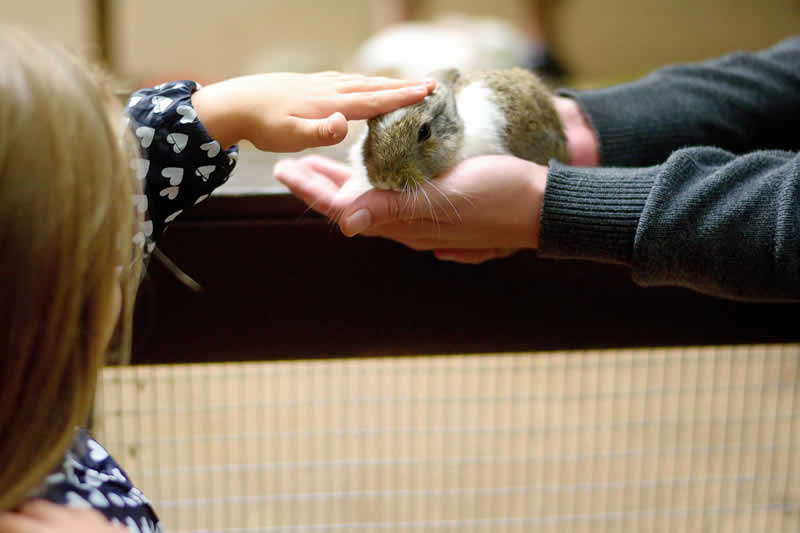 Sometimes you will have to take your rabbit to the vet, for neutering, vaccinations, dental checks or because he or she has fallen ill.
Sometimes you will have to take your rabbit to the vet, for neutering, vaccinations, dental checks or because he or she has fallen ill. • When you come in: Please bring rabbits/guinea pig in a secure cage. If your rabbit/guinea pig has a mate please bring him/her too – this helps to reduce stress.
• When you come in: Please bring rabbits/guinea pig in a secure cage. If your rabbit/guinea pig has a mate please bring him/her too – this helps to reduce stress.